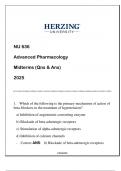intersectionality theory, and immigrant health’ – Viruell-
Fuentes, Miranda, & Abdulrahim (2012)
Abstract: Explanations for immigrant health outcomes often invoke
culture through the use of the concept of acculturation. The over reliance
on cultural explanations for immigrant health outcomes has been the topic
of growing debate, with the critics’ main concern being that such
explanations obscure the impact of structural factors on immigrant health
disparities.
Introduction
Cultural explanations mask the effects of social inequalities on immigrant
health outcomes, so a shift from individual culture-based frameworks to
perspectives that consider the role of structural factors in producing health
inequalities among immigrants are desirable.
- A richer understanding of the social determinants of immigrant
health requires an intersectional approach= considers the
simultaneous and mutually constitutive effects of the multiple social
categories ‘of identity, difference, and disadvantage’ that individuals
inhabit.
The limits of cultural explanations for immigrant health outcomes
Cultural explanations for immigrant health outcomes in the US typically
propose that culture influences social norms and individual behaviours to
impact health outcomes assumption that their health changes for the
worse.
Acculturation= an individual-level process through which individuals
acquire the ‘behaviours, attitudes and values prevalent within American
society’.
- Employing this as the central concept in the examination of
immigrant health outcomes ignores the socio-historical contexts of
migration, the racialisation of contemporary immigrants and the
role these factors play in the differential social integration of
immigrants.
Even expanded acculturation-based frameworks continue to analyse the
effects of structural contexts on health outcomes through the lens of
individual-level cultural changes and ignore other more powerful
pathways.
- Cultures of societal institutions also reproduce inequalities.
The use of static definitions of culture in public health research risks
essentialising and homogenising entire ethnic and/or immigrant groups
and perpetuating racial/ethnic stereotypes.



